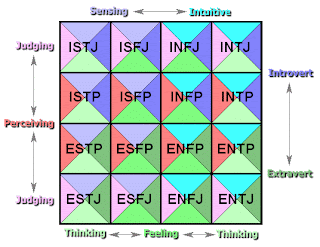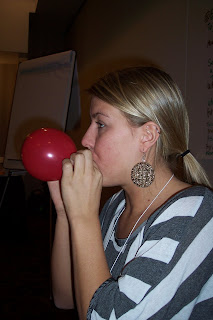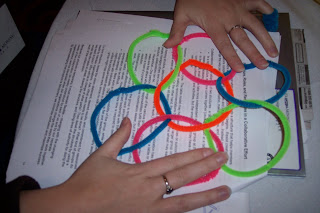

I'm in Columbus all week for In-Service Training, which is a time to pause, reflect, learn and share. It's also a chance to get back together for the first time since
pre-service orientation with all the VISTAs from across Ohio who all started around the same time.
Today I participated in a Poverty Simulation.
**Maureen, you're not allowed to read this so that it isn't ruined for you when you go to your in-service training. They asked us not to talk about it to those who haven't done it.**
Everyone was assigned a new identity and handed a card with instructions and background information about ourselves and a packet of personal affects (ID cards/monopoly money).
I was Joyce Jacobi, a 19-year-old high school dropout with a 1-year-old son, Josh. I didn't work. My son's father didn't pay child support. I lived in a rented mobile home with my new boyfriend, Jack.
My instructions said I was supposed to go see social services about finding a job so that I could keep my government benefits.
There were a variety of businesses set up around the room, like "bank," "school," "grocery store," "workplace," etc.
The simulation covered one "month," broken down into four 15-minute "weeks," in which we had to go around paying our bills, going to work, etc, and try to make ends meet. We couldn't visit anyplace without handing over a "transportation pass," which we had to buy and which stood for the gas, bus fee or walk time it took to get there.
The first "week," everyone was walking around slowly, trying to figure out where to go and what to do. By the fourth "week," it was chaos.
The first week, I visited the social services office, as instructed, but didn't make it out of the waiting room.
P.S. Bad mom moment: Just after the simulation started, while I was in the waiting room, I realized, "Oh crap I have a kid!...What did I do with him?" Luckily, my boyfriend had him. (He took him to work, which should have gotten him fired, but luckily I guess no one noticed.)
In week two, I had to go straight back to social services to finish up, so that used up another transportation pass. I also went to the grocery store and bought two weeks worth of groceries with my food stamps.
The third week, we got evicted. That was because I didn't have the money or the transportation card to get to the office and pay rent. My boyfriend was the only one working, so I had been waiting for him to have time to cash his check and maybe pawn our stereo to have enough money.
When he got back with some money and passes, the rent office was closed. Later, I was able to make a partial payment, but I had a late fee tacked on. But at least we were back in our house. I also applied for a job and was told to come back for an interview.
The fourth week, I paid the utilities and the late rent fee. I went to my job interview and, despite not having a high school diploma, talked my way into a receptionist job by saying I was a fast typist.
In the end, I think we did alright. Although we only had enough food for two of the four weeks and skimped on some other expenses, we ended the exercise with a roof over our heads, two jobs, nothing pawned and some extra cash.
But the next month, it would have started all over.
There wasn't time to think or plan and we never just sat at home together. We were always up and around, scrambling to pay this or that. "Tyranny of the Moment" it's called.
The most interesting part was the discussion at the end where we heard about everyone else's experiences. There were lots of good insights from the perspective of widowers, young kids, pregnant teens, etc.
Some families had figured out "the system" better than others -- for instance, discovering that the "Community Action Agency" office, hidden in a corner, gave away free bus passes. I never even tried going there.
We also found out the various offices had been trying (and succeeding) in ripping people off. Also, one of the staffers going around stealing unattended social security cards and trying to sell drugs (sugar packets) and other black market items.
One thing I appreciated was that my boyfriend was an jovial, resourceful hustler type. He had it all figured out and cheerfully dove right in, out there making things happen for us. That's the kind of person you need in a poverty situation. Not someone who whines or mopes or sticks their head in the sand.
Since he had the kid the whole time, I witnessed him try to use my son as a sympathy card, like asking if he could skip ahead in line for the sake of the child, but it usually didn't work. "Even with a baby, people don't give you no love" he said.
Lots of situations -- like an old widow buying drugs -- were humorous when retold in that setting. But obviously it's not funny in real life.
I thought it was an interesting exercise.





























